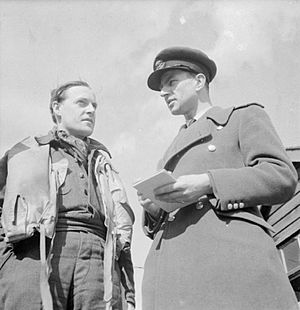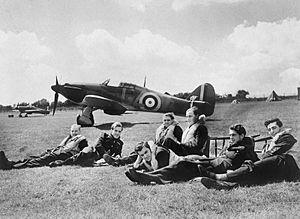Peter Malam Brothers facts for kids
Quick facts for kids
Peter Malam Brothers
|
|
|---|---|

Peter Brothers (left) in Surrey during the Battle of Britain
|
|
| Nickname(s) | Pete |
| Born | 30 September 1917 Prestwich, Lancashire |
| Died | 18 December 2008 (aged 91) |
| Allegiance | United Kingdom |
| Service/ |
Royal Air Force |
| Years of service | 1936–1947 1949–1973 |
| Rank | Air Commodore |
| Commands held | No. 457 Squadron RAAF No. 602 Squadron RAF No. 57 Squadron RAF AOC Military Air Traffic Operations Director of Public Relations (RAF) |
| Battles/wars | Second World War Malayan Emergency |
| Awards | Commander of the Order of the British Empire Distinguished Service Order Distinguished Flying Cross & Bar |
| Other work | Consultant Master of the Guild of Air Pilots and Air Navigators Chairman of the Battle of Britain Fighter Association |
Air Commodore Peter Malam "Pete" Brothers was a brave Royal Air Force (RAF) fighter pilot and a "flying ace" during World War II. He was born on September 30, 1917, and passed away on December 18, 2008. Peter Brothers was known for shooting down 16 enemy aircraft. Ten of these victories happened during the famous Battle of Britain.
Contents
Early Life and Joining the RAF
Peter Brothers was born in Prestwich, Lancashire, England. He showed an early interest in flying. He even learned to fly when he was just 16 years old!
In January 1936, he joined the Royal Air Force. By October 1936, he was part of No. 32 Squadron. He quickly moved up the ranks, becoming a flying officer by October 1938.
World War II Heroics
Peter Brothers first saw action during the Battle of Britain. This was a very important air battle fought in 1940. He was a flight commander in No. 32 Squadron RAF, flying Hurricane planes from RAF Biggin Hill.
The Battle of Britain was a very busy and dangerous time. It was during this battle that he shot down his first enemy plane, a Messerschmitt Bf 109. By the end of August 1940, he had shot down eight enemy aircraft. This made him an "ace," a pilot who has shot down five or more enemy planes.
Awards for Bravery
For his amazing actions, Peter Brothers was given the Distinguished Flying Cross (DFC). This award recognized his courage and skill in fighting the enemy. For example, in August 1940, his flight faced about 100 enemy aircraft. Even when he was attacked, he managed to shoot down a Dornier 215 and a Messerschmitt 109.
As the war continued, Peter Brothers took on more leadership roles. He became a Squadron Leader in 1941. He commanded No. 457 Squadron RAAF and later No. 602 Squadron RAF. He then became a "wing leader" for the Tangmere Wing in October 1942.
He earned a "Bar" to his DFC in June 1943. This meant he received the DFC award a second time for his continued bravery and leadership. The award recognized his outstanding skill and how he inspired his team.
In 1944, he received the Distinguished Service Order (DSO). This was another high award for his exceptional leadership and courage. By this time, he had led many missions deep into enemy territory. He was credited with destroying 13 enemy aircraft.
By the end of World War II in 1945, Peter Brothers had flown 875 hours in combat. He was officially credited with shooting down 16 enemy aircraft and damaging many more.
After the War
After World War II, Peter Brothers left the RAF for a short time. He worked in Kenya for two years. However, he soon decided to rejoin the RAF in 1949.
To his surprise, he was given command of a bomber squadron, No. 57 Squadron RAF. This squadron flew Avro Lincoln bombers. He led this squadron from 1950 to 1952. During this time, he was involved in the Malayan Emergency campaign.
He continued to rise through the ranks. He became a Wing Commander in 1952. Later, he flew V bombers, which were powerful jet bombers. He was promoted to group captain in 1959 and then to Air Commodore in 1966.
Peter Brothers held several important positions in the RAF. He retired from the Royal Air Force in 1973. In 1964, he was honored with the Commander of the Order of the British Empire (CBE).
Life After the RAF
Even after retiring, Peter Brothers remained very involved with the RAF community. He was well-known for his actions during the Battle of Britain. For many years, he served as the Chairman of the Battle of Britain Fighter Association. This group helped remember the brave pilots who fought in that battle.
Peter Brothers passed away on December 18, 2008, at the age of 91.
He is remembered with a special memorial called the "Spirit of The Few" Monument. It was unveiled in 2022 at Hawkinge airfield. This monument includes seven bronze sculptures of pilots from No. 32 Squadron. These sculptures are based on a famous photograph taken during the Battle of Britain. Peter Brothers is one of the pilots shown in the monument.
 | John T. Biggers |
 | Thomas Blackshear |
 | Mark Bradford |
 | Beverly Buchanan |


